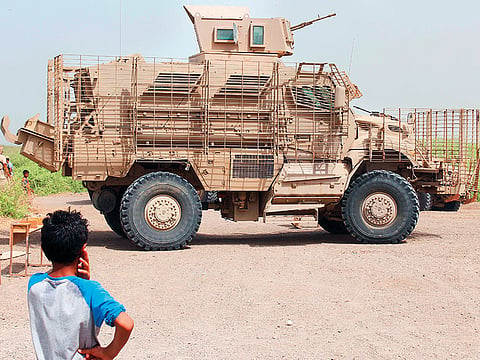Al Houthis launch failed attack on Saudi tanker
UN envoy in Sana’a for new talks with militants on embattled Hodeida

Cairo: Yemen’s Al Houthi militants on Wednesday launched a failed attack on a Saudi oil tanker in the Red Sea, an Arab coalition fighting the Iran-allied militia said.
The Saudi-led coalition added that the tanker had been slightly damaged.
The alliance warned against the continued threats by Al Houthis to international navigation and trade in the Red Sea. “This can cause an environmental catastrophe,” the coalition added, according to Dubai-based Al Arabiya television.
The Iran-aligned extremists have repeatedly threatened to attack oil tankers using Bab Al Mandab, a vital waterway between the Arabian Peninsula and Africa, linking the Red Sea with the Gulf of Aden and the Suez Canal.
Meanwhile, Yemeni Foreign Minister Khalid Al Yamani told WAM that the insurgents’ strategy of buying time will ultimately prove futile. He said the UN Special Envoy to Yemen Martin Griffiths’ new initiative on Hodeida is being met with intransigence and evasive manoeuvres by Al Houthis.
Al Yamani said, following a media briefing he had on Tuesday in Abu Dhabi, that the UN envoy’s initiative is crystal clear and consists of three main points. “The first is the full withdrawal of Al Houthis from Hodeida and handing over control over the city to the Yemeni Ministry of Interior. The second point is ensuring the control of the legitimate government’s Central Bank over the financial resources of the Hodeida Port, while the third was to allow UN supervisors access to help improve the performance of ports and ensure enforcement of Article 14 of UNSC Resolution No. 2216 on banning the supply of arms.”
“We are extending our hand to the UN Special Envoy who has had enough time to contact the Al Houthis,” he added.
“If the Al Houthis do not withdraw from Hodeida and Yemen’s Red Sea Coast, Yemen’s legitimate government and the Saudi-led Arab Coalition have all options, under the international law and with the blessing of the international community, to accomplish the mission and ensure full liberation of our territories until Sana’a,” he stated.
The minister expressed his satisfaction with his first visit to the UAE saying, “The UAE is a main partner of the Coalition in support of legitimacy in Yemen.”
He described his country’s unbreakable relations with the UAE as ‘deeply rooted’ in history and sharing common destiny.
“We are today fighting together for the sake of legitimacy and for thwarting the expansionist schemes in the region.”
He expressed sincere thanks to the UAE for all that it had offered to Yemen in this exceptional stage the country is going through. “The UAE has not only extended a hand of help, but also the Emiratis have sacrificed their lives in a way that will remain indelible in the history and memory of all Yemenis.”
Last month, the Coalition unleashed a massive offensive aimed at driving Al Houthis out of Hodeida in west Yemen. The campaign, the biggest in Yemen’s three-year-old war, has been temporarily halted in support of UN efforts to restart long-stalled peace talks and avert an all-out battle in Hodeida.
Griffiths arrived on Wednesday in the Al Houthi-controlled capital Sana’a, the latest in his efforts to bring the country’s warring sides to negotiations, Yemeni media reported.
The former British diplomat is expected to hold talks with Al Houthi leaders on the fate of Hodeida and prospects for peace negotiations.
The visit comes three days after Yemeni Prime Minister Ahmad Bin Dagher demanded Al Houthis release all prisoners they are holding as a goodwill gesture before the start of any negotiations.
Bin Dagher relayed the demand to the international mediator at their meeting in the Saudi capital on Sunday.
The internationally recognised government and supportive coalition have repeatedly demanded Al Houthis to hand over Hodeida, of which the militants have been in control since October 2014.
Hodeida is strategically important because its harbour is considered a lifeline for millions of Yemenis, as most of the commercial imports and relief supplies enter through it to the country.
The coalition accuses Al Houthis of taking advantage of their control of Hodeida port to obtain weapons from their Iranian patrons as well as confiscate aid intended for Yemenis in order to sustain their war efforts.
— With inputs from WAM



